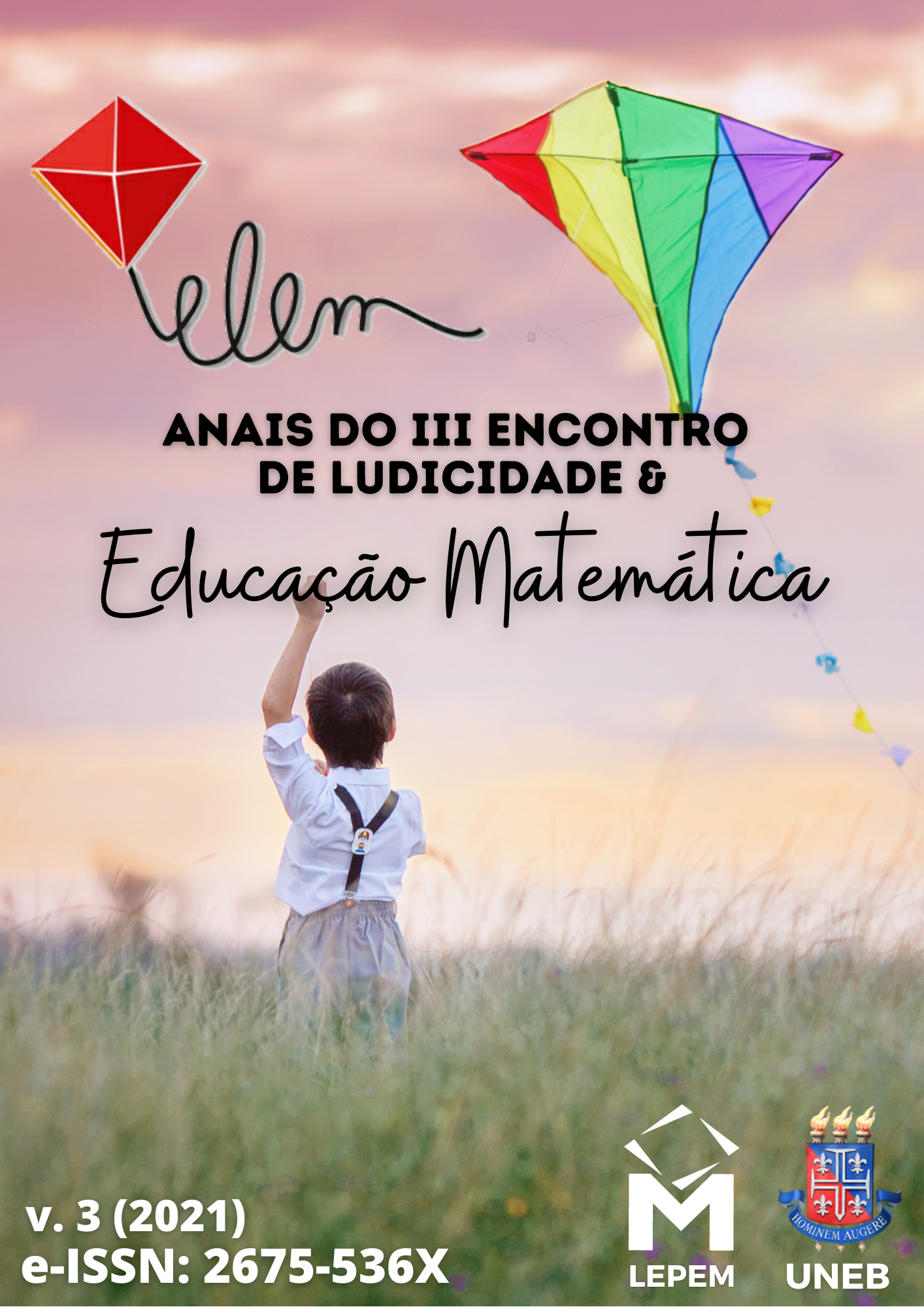Flow Theory: building games for learning math
Keywords:
GameGames. Math Education. FlowAbstract
The game and playing are part of students' daily activities and are instruments that enable self-discovery, motivation, self-confidence, self-esteem, stimulate reasoning, creativity, contributing to the student's physical, cognitive and social health. In this sense, this work focuses on understanding how the Flow Theory can help in the construction of games for learning mathematics. Flow is based on the balance between capacity and challenge, characterized by a deep concentration on a limited set of stimuli that are accepted by the person as relevant, that is, the moment when a person is fully concentrated and absorbed in an activity. These circumstances provide an environment in which curiosity and challenge serve as motivation and facilitate concentration, involvement and, consequently, learning. The results show that it is possible to develop a game favorable to math learning, following the eight characteristics presented in Flow, which are essential to structure situations that promote interaction, development of a learning posture, challenge, opportunity for action and example.
Downloads
References
CSIKSZENTMIHALYI, M. Flow: the psychology of optimal experience. 1st ed. Harper Perennial Modern Classiscs, 1990.
_____________. Finding Flow: The Psychology of Engagement With Everyday Life. In: Psychology Today, jul/ago, p. 1-7, 1997.
______________. A descoberta do fluxo: a psicologia do envolvimento com a vida cotidiana. Rio de Janeiro. Rocco, 1999.
______________. Applications of Flow in Human Development and Education. The Collected Works of Mihaly Csikszentmihalyi. Springer International Publishing, 2014a.
______________. Flow and the Foundations of Positive Psychology. The Collected Works of Mihaly Csikszentmihalyi, Springer International Publishing 2014b.
CSIKSZENTMIHALYI, M.; WONG, M. M. Motivation and Academic Achievement: The Effects of Personality Traits and the Quality of Experience. In: CSIKSZENTMIHALYI, M. Applications of Flow in Human Development and Education. The Collected Works of Mihaly Csikszentmihalyi. Springer International Publishing, 2014.
GRANDO, R. C. O conhecimento matemático e o uso de jogos na sala de aula. 239 fs. Tese de doutorado em educação. Universidade Estadual de Campinas, 2000.
HÖGBERG, J.; HAMARI, H.; WÄSTLUND, E. Gameful Experience Questionaire (GAMAFULQUEST) an instrument for measuring the perceived gamefulness of system use. In: User Modeling and User-Adapted Interaction, v. 29(2), jun.,2019.
HUIZINGA, J. Homo Ludens: o jogo como elemento da cultura. 2. ed. Tradução João Paulo Monteiro. São Paulo: Perspectiva, 2000.
KIILI, K. On educational game design: building blocks of Flow experience. Tese de Doutorado em Filosofia, Tampere University of Technology. Tampere, Finland, 2005.
KILLI, K. EVALUATIONS OF AN EXPERIENTIAL GAMING MODEL. In: An Interdisciplinary Journal on Humans in ICT Environments, v. 2 (2), oct., p. 187-201, 2006.
KISHIMOTO, T. M. Jogos, brinquedo e brincadeiras no Brasil. In: Espacios em Blanco – Serie Indagaciones, n. 4, p. 81-106, jun., 2014.
MENEZES, S. B. D. Jogos matemáticos: aplicando em uma turma de curso técnico em enfermagem. 53fs. Dissertação de Mestrado Profissional em Matemática em Rede Nacional - Universidade Estadual do Sudoeste da Bahia. Vitória da Conquista: BA, 2014.
NUNES, M. S. V. Elaboração e desenvolvimento de jogo matemático para aplicações web mobile como auxílio dos processos da matemática financeira. Dissertação de Mestrado Profissional em Computação Aplicada - Universidade Estadual Ceará – UECE, Ceará, 2017.
RODRIGUES, G. S. Uma Proposta de Aplicação de Jogos Matemáticos no ensino básico. Dissertação de Mestrado Profissional em Matemática em Rede Nacional – UNB. Brasília: DF, 2018.
SANTOS, W. O.; GOMES, T. C. S.; SILVA, C. C. V. Towards to flow state Identification, in Educationa Games: asn Empirical Study. In: Anais do XXVIII Simpósio Brasileiro de Informática na Educação (SBIE 2017). VI Congresso Brasileiro de Informática na Educação (CBIE 2017), p. 702 – 711. 2017.
SILVA, U. M. As frações e os jogos matemáticos: uma relação de interação em turmas do 6º ano do ensino fundamental. 175fs. Dissertação de Mestrado Profissional em Ensino de Ciências e Matemática. Universidade Federal de Alagoas, 2015.
Downloads
Published
How to Cite
Issue
Section
License
Uma nova publicação de artigo anteriormente publicado nos Anais do Encontro de Ludicidade e Educação Matemática, fica sujeita à expressa menção da precedência de sua publicação neste periódico, seguindo as normas de referência. Autores que publicam nos Anais do ELEM concordam com os seguintes termos:
-
O Conselho Editorial se reserva ao direito de efetuar, nos originais, alterações de ordem normativa, sintática, ortográfica e bibliográfica com vistas a manter o padrão culto da língua, respeitando, porém, o estilo dos autores. As provas finais poderão ou não ser enviadas aos autores.
-
Autores mantém os direitos autorais e concedem à revista o direito de primeira publicação, com o trabalho simultaneamente licenciado sob a Licença Creative Commons Attribution (CC BY-NC-SA).
-
Autores têm autorização para assumir contratos adicionais separadamente, para distribuição não-exclusiva da versão do trabalho publicada nos Anais do ELEM; exemplo: publicar em repositório institucional ou como capítulo de livro, com reconhecimento de autoria e publicação inicial nos Anais do ELEM.
-
Autores têm permissão e são estimulados a publicar e distribuir seu trabalho online — em repositórios institucionais, página pessoal, rede social ou demais sites de divulgação científica.





